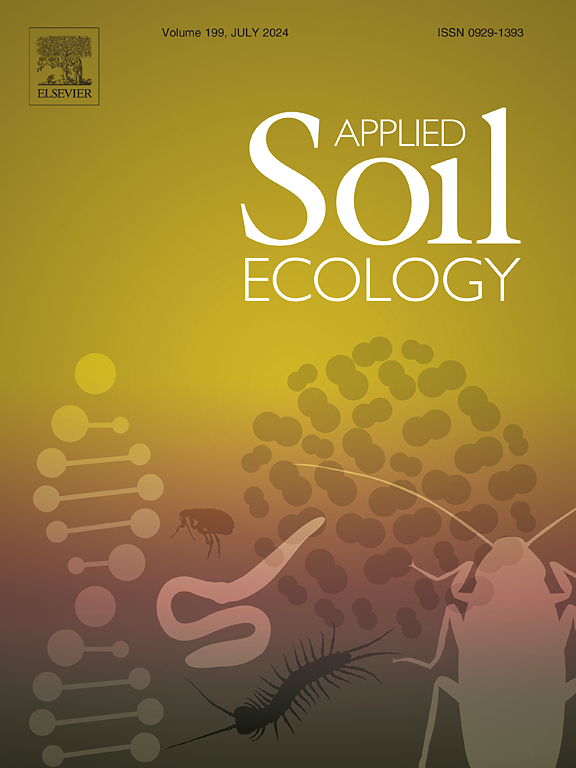在半干旱沙质土壤中,棉花生产过程中的土壤细菌和真菌微生物群对耕作和覆盖作物的敏感性高于灌溉水平
IF 4.8
2区 农林科学
Q1 SOIL SCIENCE
引用次数: 0
摘要
半干旱地区的土地管理者面临着严峻的气候条件,如多变的降雨量、极端的温度和长期的干旱,而这些情况预计将在未来几十年内加剧。为减少侵蚀和恢复退化土壤而实施的保护措施会改变土壤性质,从而影响土壤微生物组的组成和功能。我们比较了在不同灌溉水平(高、低)的砂壤土半干旱土壤中,大量土壤(0-10 厘米、10-20 厘米)和根系相关土壤对长期(7 年)耕作和种植管理变化的微生物组反应。耕作制度包括传统耕作制度(连作单季连续耕作,CCCT)与两种免耕制度(包括黑麦覆盖作物(NTCR)或棉花/小麦轮作(NTCW))。我们发现,在不同的分类水平上,微生物组结构受管理方法的影响大于灌溉的影响。耐旱类群也在细菌群落中占主导地位,高灌溉和低灌溉之间没有显著差异。总体而言,这种沙质土壤的研究结果表明,耕作和植被管理比灌溉水平更能促进细菌和真菌微生物组的组成,这表明即使在水资源有限的条件下,保护性管理措施在半干旱土壤中也是有效的。本文章由计算机程序翻译,如有差异,请以英文原文为准。
Soil bacterial and fungal microbiomes under cotton production are more sensitive to tillage and cover crops than irrigation level in a semi-arid sandy soil
Land managers in semi-arid regions experience challenging climatic conditions, such as variable rainfall, extreme temperature, and prolonged droughts that are expected to intensify over the next few decades. Conservation practices implemented to reduce erosion and restore degraded soils can alter soil properties that affect the composition and function of the soil microbiome. We compared microbiome responses to long-term (> 7 years) tillage and cropping management changes in bulk (0–10 cm, 10–20 cm) and root-associated soils under differing irrigation levels (High, Low) in sandy loam semi-arid soil. Cropping systems included a traditional system (Continuous tillage with continuous monocrop, CCCT) compared to two no-tillage systems that included a rye cover crop (NTCR) or a cotton/wheat rotation (NTCW). We found that microbiome structure was influenced more by management practices than irrigation across taxonomic levels. Drought-tolerant taxa also dominated bacterial communities, with no significant differences between high and low irrigation. Overall, the results from this sandy-textured soil show that tillage and vegetation management were stronger drivers of bacterial and fungal microbiome composition than irrigation level, demonstrating the efficacy of conservation management practices in semi-arid soils even under water-limited conditions.
求助全文
通过发布文献求助,成功后即可免费获取论文全文。
去求助
来源期刊

Applied Soil Ecology
农林科学-土壤科学
CiteScore
9.70
自引率
4.20%
发文量
363
审稿时长
5.3 months
期刊介绍:
Applied Soil Ecology addresses the role of soil organisms and their interactions in relation to: sustainability and productivity, nutrient cycling and other soil processes, the maintenance of soil functions, the impact of human activities on soil ecosystems and bio(techno)logical control of soil-inhabiting pests, diseases and weeds.
 求助内容:
求助内容: 应助结果提醒方式:
应助结果提醒方式:


